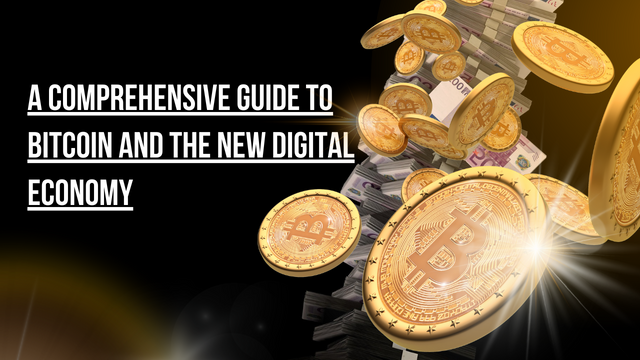
Step into the exciting world of Bitcoin and the new digital economy with this comprehensive guide. As the global financial landscape continues to evolve, understanding the potential of this groundbreaking technology is more important than ever. In this article, we will demystify Bitcoin and explore how it is reshaping our understanding of money, finance, and transactions.
Whether you're a seasoned investor or just curious about cryptocurrencies, this guide will provide you with the knowledge and tools to navigate the world of Bitcoin with confidence. Learn about the history of Bitcoin, how it works, and the principles behind its secure and decentralized nature.
Discover the benefits of using Bitcoin for everyday transactions, such as lower fees, faster transactions, and enhanced privacy. Explore the potential of blockchain technology and how it is revolutionizing industries beyond finance.
With expert insights and practical advice, we aim to empower you to make informed decisions in the ever-expanding digital economy. Get ready to unlock the potential of Bitcoin and embrace the future of finance.
Understanding the Basics of Bitcoin
Bitcoin, introduced in 2009 by an anonymous person or group known as Satoshi Nakamoto, is a decentralized digital currency that operates on a peer-to-peer network. At its core, Bitcoin is based on a technology called blockchain, which is a distributed ledger that records all transactions made with the currency.
One of the key features of Bitcoin is its decentralized nature. Unlike traditional currencies that are controlled by central banks, Bitcoin is not issued or regulated by any government or financial institution. This means that transactions can be conducted directly between users without the need for intermediaries.
Bitcoin transactions are verified by network nodes through cryptography and recorded on the blockchain. This ensures the security and integrity of the system, making it nearly impossible to manipulate or counterfeit the currency. Additionally, the limited supply of Bitcoin, with a maximum of 21 million coins, adds to its scarcity and value.
Understanding the basics of Bitcoin is crucial for anyone looking to participate in the digital economy. By grasping the underlying technology and principles, you can make informed decisions about its potential applications and benefits.
The History and Evolution of Bitcoin
To fully understand the potential of Bitcoin, it is important to delve into its history and evolution. Bitcoin emerged in the aftermath of the global financial crisis of 2008, as a response to the shortcomings of the traditional financial system.
Satoshi Nakamoto's whitepaper, titled "Bitcoin: A Peer-to-Peer Electronic Cash System," outlined the concept of a decentralized digital currency that could operate without the need for intermediaries. This groundbreaking idea quickly gained traction among a niche group of early adopters and tech enthusiasts.
In 2010, Bitcoin made headlines when Laszlo Hanyecz famously purchased two pizzas for 10,000 Bitcoins, marking the first real-world transaction using the cryptocurrency. This event highlighted the potential of Bitcoin as a medium of exchange and sparked further interest in its use.
Over the years, Bitcoin has faced its fair share of challenges and controversies. From the Silk Road marketplace debacle to the Mt. Gox exchange hack, the cryptocurrency has been tested by various external factors. However, it has also continued to grow and evolve, attracting a wider user base and gaining recognition from mainstream institutions.
The evolution of Bitcoin has seen the rise of numerous altcoins, or alternative cryptocurrencies, each with its own unique features and use cases. While Bitcoin remains the dominant player in the digital currency space, the emergence of altcoins has added diversity and innovation to the market.
Benefits and Potential of Bitcoin in the Digital Economy
Bitcoin offers several benefits and potential advantages in the digital economy. One of the key advantages is the lower transaction fees compared to traditional financial systems. When sending money internationally or making online purchases, traditional payment methods often involve high fees and lengthy processing times. Bitcoin eliminates these hurdles by allowing for fast and low-cost transactions.
Another benefit of Bitcoin is the enhanced privacy it offers. While traditional financial systems require users to disclose personal information, Bitcoin transactions can be conducted pseudonymously. This provides users with a greater level of financial privacy and protection against identity theft.
The decentralized nature of Bitcoin also makes it resistant to censorship and government interference. In countries with unstable economies or oppressive regimes, Bitcoin can provide individuals with a way to store and transfer value outside of traditional banking systems.
Furthermore, Bitcoin has the potential to revolutionize remittances, which are the transfer of money by foreign workers to their home countries. The high costs associated with traditional remittance methods can be significantly reduced by utilizing Bitcoin and its low transaction fees.
Beyond everyday transactions, Bitcoin has the potential to disrupt industries beyond finance. The underlying technology, blockchain, is being explored for applications in supply chain management, voting systems, intellectual property protection, and more. The transparency and immutability of the blockchain make it an attractive solution for various sectors.
How to Get Started with Bitcoin - Setting Up a Digital Wallet
To start using Bitcoin, the first step is to set up a digital wallet. A digital wallet is a software application that allows you to securely store, send, and receive Bitcoin. There are various types of wallets available, including desktop wallets, mobile wallets, web wallets, and hardware wallets.
Desktop wallets are downloaded and installed on your computer, offering a high level of security. Mobile wallets, on the other hand, are apps that can be installed on your smartphone, providing convenience for making transactions on the go. Web wallets are cloud-based and can be accessed through a web browser, while hardware wallets are physical devices that store your Bitcoin offline, providing the highest level of security.
When choosing a wallet, it is important to consider factors such as security, ease of use, and compatibility with your devices. Research different wallet options and choose one that best suits your needs.
Once you have set up your digital wallet, you can acquire Bitcoin by purchasing it from a cryptocurrency exchange or receiving it as payment for goods and services. Many exchanges require you to complete a verification process before you can start trading, so be prepared to provide identification documents.
When it comes to storing your Bitcoin, security is paramount. Ensure that you back up your wallet's private keys and employ additional security measures such as two-factor authentication to protect your funds.
Bitcoin Mining and Its Role in the Digital Economy
Bitcoin mining plays a crucial role in the digital economy by verifying transactions and maintaining the security of the network. Mining involves solving complex mathematical problems using specialized hardware, known as mining rigs, to add new blocks to the blockchain.
Miners compete to solve these mathematical problems, and the first one to find the solution is rewarded with newly minted Bitcoins. This process is known as proof-of-work, as it requires computational power to secure the network and validate transactions.
Mining is not only essential for the operation of the Bitcoin network but also provides an opportunity for individuals to earn Bitcoin. However, it is worth noting that mining has become increasingly competitive and resource-intensive over the years. As a result, many miners have joined mining pools, where they combine their resources to increase their chances of earning rewards.
While mining can be profitable, it is important to consider the associated costs, such as electricity and hardware expenses. Additionally, the environmental impact of Bitcoin mining has raised concerns, as it requires a significant amount of energy to power the mining rigs.
Investing in Bitcoin and the Potential Returns
Bitcoin has gained a reputation as a speculative investment, with the potential for significant returns. Over the years, the price of Bitcoin has experienced dramatic fluctuations, attracting both investors and speculators.
Investing in Bitcoin can be done through various channels, such as cryptocurrency exchanges, investment funds, or even purchasing Bitcoin directly from individuals. It is important to conduct thorough research and consider factors such as market trends, risk tolerance, and investment goals before investing in Bitcoin.
While Bitcoin has shown the potential for high returns, it is also subject to volatility and market risks. Prices can fluctuate rapidly based on factors such as regulatory developments, market sentiment, and technological advancements. It is important to approach Bitcoin investment with caution and diversify your investment portfolio to manage risks effectively.
Challenges and Risks of Bitcoin in the Digital Economy
While Bitcoin has gained popularity and recognition, it still faces several challenges and risks in the digital economy. One of the key challenges is scalability, as the Bitcoin network can only handle a limited number of transactions per second. This has led to high transaction fees and slower processing times during periods of high demand.
Regulatory challenges are another factor to consider, as governments around the world grapple with how to regulate and tax cryptocurrencies. The lack of a unified regulatory framework can create uncertainty and hinder the widespread adoption of Bitcoin.
Security is also a concern in the digital economy, as hackers and scammers target cryptocurrency users. From phishing attacks to malware that steals private keys, individuals must take precautions to protect their Bitcoin holdings.
Furthermore, the perception of Bitcoin as a speculative investment can lead to market manipulation and price manipulation. Pump-and-dump schemes, where individuals artificially inflate the price of a cryptocurrency before selling, can deceive unsuspecting investors.
It is important to stay informed about the potential risks and challenges associated with Bitcoin and take appropriate measures to mitigate them.
Regulations and Legal Considerations for Bitcoin
As Bitcoin continues to gain mainstream recognition, regulatory frameworks are being developed to govern its use. The approach to Bitcoin regulation varies from country to country, with some embracing the technology and others imposing strict regulations.
It is important to understand the legal considerations and obligations when using Bitcoin. In many jurisdictions, Bitcoin is considered a taxable asset, and individuals are required to report capital gains and losses to the relevant tax authorities.
Additionally, Anti-Money Laundering (AML) and Know Your Customer (KYC) regulations may apply to cryptocurrency exchanges and businesses that deal with Bitcoin. These regulations aim to prevent illicit activities such as money laundering and terrorism financing.
Before engaging in any Bitcoin-related activities, it is advisable to consult with legal and tax professionals to ensure compliance with local regulations.
Conclusion: Embracing the Future of the Digital Economy with Bitcoin
As we conclude this comprehensive guide to Bitcoin and the new digital economy, it is clear that the potential of this groundbreaking technology is immense. Bitcoin has the power to redefine our understanding of money, finance, and transactions.
By understanding the basics of Bitcoin, exploring its history and evolution, and recognizing its benefits and potential, you can unlock the opportunities offered by the digital economy. Whether you choose to use Bitcoin for everyday transactions, invest in it for potential returns, or explore its revolutionary applications in industries beyond finance, the future is bright for this innovative technology.
However, it is important to approach Bitcoin with caution, considering the challenges, risks, and legal considerations. Stay informed, conduct thorough research, and take appropriate measures to protect your Bitcoin holdings.
The digital economy is evolving at an unprecedented pace, and Bitcoin is at the forefront of this transformation. Embrace the future of finance, unlock the potential of Bitcoin, and embark on a journey into the new digital economy. The possibilities are limitless, and the rewards can be extraordinary.
